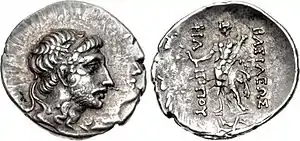Andriscus
Andriscus (Ancient Greek: Ἀνδρίσκος, Andrískos), also often referenced as Pseudo-Philip, was the last king of Macedon (r. 149–148 BC). A pretender, who claimed to be the son of Perseus of Macedon, he was a fuller from Adramyttium in Aeolis in western Anatolia. His reign lasted just one year and was toppled by the Roman Republic during the Fourth Macedonian War.

Life

In 168 BC, the Romans invaded Macedonia and overthrew King Perseus in the First Battle of Pydna.
In 150 BC, Andriscus, claiming to be Perseus' son, announced his intention to retake Macedonia from the Romans. Livy gives his claim as follows:
A certain Andriscus, a man of the lowest kind, pretending to be a son of king Perseus, changed his name into Philip, and secretly fled from the city of Rome, to which king Demetrius [I Soter] of Syria had sent him, precisely because of this lie; many people were attracted by his false story (as if it were true), he gathered an army and occupied all of Macedonia, whether the people wanted it or not. He told the following story: born as the son of king Perseus and a courtesan, he had been handed over for education to a certain Cretan, so that, in this situation of war against the Romans, some scion of the royal stock would survive. Without knowledge of his family and believing that the man who taught him was his father, he had been educated at Adramyttion until he was twelve years old. When this man fell ill and was close to the end of his life, he finally told Andriscus about his origin and gave his "mother" a writing that had been sealed by king Perseus, which she should give the boy when he reached maturity, and the teacher added that everything had to be kept secret until that moment. When he reached maturity, Andriscus received the writing, from which he learned that his father had left him two treasures. Until then he had only known that he was a foster son and had been unaware about his real ancestry; now his foster mother told him about his lineage and begged him to avoid being assassinated by departing from the country before the news reached [king] Eumenes [II Soter of Pergamon], an enemy of Perseus. Frightened and hoping to obtain assistance from Demetrius, he went to Syria, where he had declared for the first time who he was.
— Livy, "The Periochae, books 46-50", [1]
Andriscus travelled to Syria to request military help from the Seleucid monarch, Demetrius I Soter. Instead he was handed over to the Romans, but Andriscus managed to escape from Roman captivity and raised a Thracian army. With this army, he invaded Macedonia and defeated the Roman praetor Publius Juventius. Andriscus then declared himself King Philip VI of Macedonia.[2]
In 148 BC, Andriscus conquered Thessaly and made an alliance with Carthage, which angered the Romans who declared war (Fourth Macedonian War) on Macedonia. He was defeated by the Roman praetor Quintus Caecilius Metellus Macedonicus in the Battle of Pydna. Following the battle, he fled to Thrace, whose prince gave him up to Rome, thus marking the end to Andriscus' reign of Macedonia. Macedonia was then formally reduced to a Roman province.[2]
It was said that Andriscus' brief reign over Macedonia was marked by cruelty and extortion.[2]
References
Sources
| Wikimedia Commons has media related to Andriskos. |
- Velleius Paterculus i. 11; Florus ii. 14;
- Livy, Epit. 49, 50, 52; Diod. Sic. xxxii. 9.
Attribution
 This article incorporates text from a publication now in the public domain: Chisholm, Hugh, ed. (1911). "Andriscus". Encyclopædia Britannica. 1 (11th ed.). Cambridge University Press. p. 975.
This article incorporates text from a publication now in the public domain: Chisholm, Hugh, ed. (1911). "Andriscus". Encyclopædia Britannica. 1 (11th ed.). Cambridge University Press. p. 975. This article incorporates text from a publication now in the public domain: Smith, William (1870). "Andriscus". In Smith, William (ed.). Dictionary of Greek and Roman Biography and Mythology. 1. p. 171.
This article incorporates text from a publication now in the public domain: Smith, William (1870). "Andriscus". In Smith, William (ed.). Dictionary of Greek and Roman Biography and Mythology. 1. p. 171.

